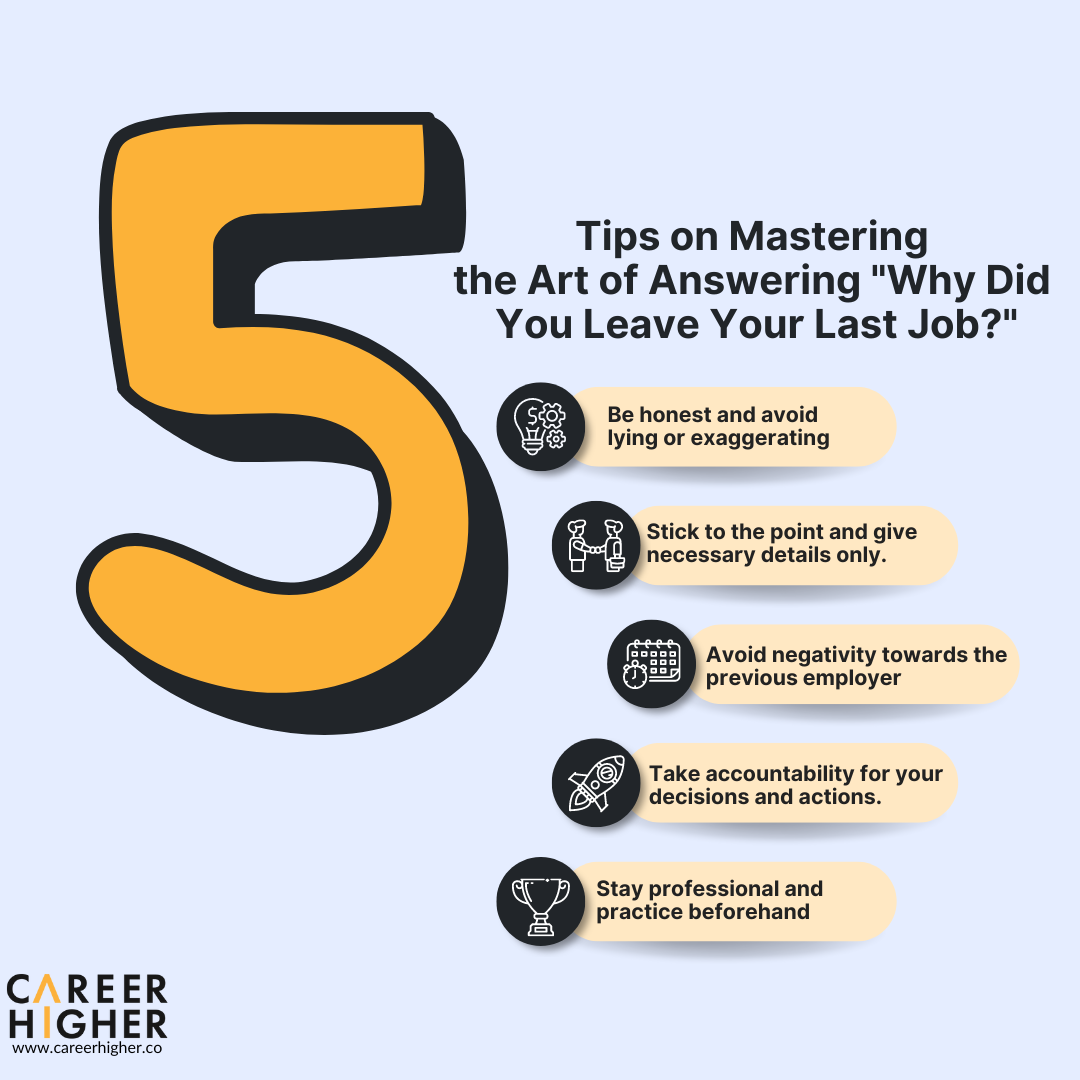Table of Contents
While every interview is different, there are a few questions that feature in most interviews irrespective of the job role or company. Preparing your answers to these questions can make your interview process easier. It can also help instill confidence as you put your answers forward.
One of the most common questions is, “Why did you leave your last job?”. Sharing the unfiltered circumstances under which you left the job may not always be the best way forward. Instead, you’d want to work out the most relevant way to represent your situation while always remaining honest. If you’re not sure what to say, read on to prepare:
Why Do Recruiters Ask the Question “Why Did You Leave Your Previous Job”?
Before you craft your answer, it is imperative to know two things- why the question is being asked and what the recruiter wants to hear. Your answer to “why did you leave your job?” reveals some key information to recruiters. This includes:
- Was your employment terminated by the employer?
- What is your motivation behind looking for a new job?
- Are you on good terms with your previous employer?
- Are your reasons justified?
- Do you carry a sense of loyalty to your previous employer?
Given the importance of this question, your answer should include two key elements. Firstly, you need to explain why you left your previous job. Secondly, you should offer a reason that shows your decision was reasonable. The interviewer may phrase this question in different ways, such as:
- Why are you looking for a new job?
- Why did you quit?
- What made you leave your old job?
- Why did you choose to leave your current company?
Regardless of how the interviewers phrase the question, your core answer should remain the same. There are several effective ways to answer this loaded question. We have collated these answers into a few categories. These are based on the nature of termination and the ease with which you can justify your reason.
Best Answers for the Question “Why Did You Leave Your Previous Job?”
When a hiring manager asks you, “Why did you leave your last job?”, they provide you with a chance to share your career story and demonstrate your professionalism. You may have left your job due to various reasons, maybe you were looking for increased pay, better growth opportunities, or developed an interest in another field. However, other times, it may have been a challenging departure. Regardless of the situation, the key is to approach the question with tact and professionalism, presenting your circumstances in the best possible light.
If your reasons for leaving your previous job are easily explainable, such as pursuing a better career opportunity, you may not need to elaborate too much. However, it’s important to be clear and effective in your response, so that your new employer can recognize your well-planned career goals. Conversely, if your departure was involuntary, it is essential to provide an honest account of the situation without resorting to being negative about your previous employer. To help you craft the best response, we’ve compiled answers that are categorized by whether your departure was voluntary or involuntary.
1) Voluntary Termination
a) You expect more pay
Maybe your previous company’s pay structure did not match industry standards or your lifestyle changes required you to have higher pay. Putting the same forward bluntly can make you seem greedy. You can shift this image by highlighting other factors that motivate you.
Example Answer:
“Having an engaging job with challenges has always been a primary priority for me. I also find that having a good pool of peers and mentors keeps me motivated. While my previous job catered to some of these needs, I am at a juncture where I would prefer a payment structure that matches my contribution better. I am now looking for a company that can cater to both my career goals as well as my monetary needs”
b) You did not like the company
While it may not always be clear externally, companies can sometimes have environments that are not conducive to growth. This may be the reason you chose to move on. In this case, your goal should be to put your reason across without bad-mouthing your previous company as that would reflect poorly on your loyalty.
Example Answer:
“I have enjoyed working at <current company>. Initially, we had a lot of new projects and technologies to work on and that helped me sharpen my skills. However, recently I have started to feel like the projects coming in are not challenging enough. I believe that <new company> has several opportunities for growth and to take on new challenges.”
c) You don’t like the job role
Maybe you’ve outgrown the role or you may even just feel like it has gotten monotonous. When sharing this reason, ensure that you do not come across as someone who is easily bored and may skip jobs quickly. Shift focus to motivation instead.
Example Answer:
“I have enjoyed working as a <role> for the last couple of years. It has helped me expand my skill set and get ahead on my career journey. That said, the opportunities for further growth are limited in my current role. I am hoping to find a new role that provides me with learning opportunities and new challenges that could keep me motivated.”
d) You were overworked
Being overworked is a genuine reason to switch jobs. But if you’re not careful, you may end up representing yourself as lazy or unmotivated. You could instead highlight a need to bring in work-life balance.
Example Answer:
“I have always loved taking on a good challenge at work, and I’ve had the pleasure of overcoming a few. But I have come to the realization that I do my best work when I am well-rested and have an adequate balance between work and life. I am hoping to find a job that allows me to focus more on health and life outside of work, and in turn, put in the most efficient work within working hours.”
e) You’re looking for career growth
“I have been working as a <job> for <years> years. I was able to pick up all the necessary skills and work on some great projects along the way. I have now reached a juncture where the current organization is unable to support further growth. So I’m looking to move to a job that advances my career trajectory better.”
e) You’re changing career paths
“While I have enjoyed working at <job>, my experience at work and well-timed personal exploration has led me to believe that I am better suited for a career in <new field>. This change is not possible at my current workplace. Therefore, I’d like to take on an appropriate opportunity elsewhere and hone my skills in this new field”
f) You’re looking for better opportunities
“I have had the pleasure of working on several different projects and technologies at my previous job. However, I’ve reached a peak when it comes to learning opportunities at the company. So, I am looking for a job where I can work on something new, something that challenges me.”
g) You feel the need for a new environment
“I have been working at <company> for <years> years. Unfortunately, I’ve reached a point where I am a little too comfortable at my job. I find most tasks easier to do and less challenging. I am looking for a new environment that breaks me out of the rut, brings on new opportunities, and thus, renewed motivation.”
h) You’re looking for a job that speaks to your passion
“I have spent <no. of years> years working as a <job>. My experience has led me to realize that I may not be as passionate about the field. I am certain that my skill and more importantly, my interests lay in <new field>. I’d like to be able to explore this field as I feel my passions would be better served.”
i) There has been a change in management
“I decided to leave my previous position after my manager retired. This reduced my ability to receive adequate mentorship and limited my learning opportunities. I believe it would be wise to move on to a job that gives me that.”
j) You have been on a career break
“I was working at <company> for a few years before I left the job to focus on my health. I took the time to work on my health and also happened to take up several freelance projects that kept my skills sharp. I am now at a juncture where I feel ready to return to work.”
k) There has been a change in your family status
“A few years ago, I had to step away from work to focus on my family. I had just had a baby and felt like I needed to devote more time to my home. I’ve had the opportunity of working on a few freelance projects during my time off. I am now ready to return to work and put my skills to use.”
2) Involuntary Termination
Maybe your company went through a season of lay-offs. Or maybe you were going through a rough patch and couldn’t put in your best work. Either way, this is a sensitive topic to address. While lying about being fired is an absolute ‘no’, you can work on representing the experience better.
a) You were fired due to redundancy or during lay-offs
Large companies often choose to hire more people than they need. This is done so there is always a fallback in case of an increase in workload or absence. If you were let go to reduce redundancy, here’s what you can say:
Example Answer:
“I’ve been working with <company> for a while now. The role matched my skill set and my interests adequately. There were, however, several people handling similar tasks. As the company downsized, a few of us were let go. I am now looking for a job that can engage my talents better and provide me with a more challenging environment for growth.”
b) You’ve had difficulty working in the environment
You may have been having a difficult time at work, where you felt the environment did not suit you best. It is possible that an incompatible fit between the team and you could have caused a dip in performance and you may have been let go. When discussing this topic, don’t try to hide the truth. Explain your situation and draw attention to the fact that you have learned something from the experience.
Example Answer:
“In the interest of keeping things transparent, I loved the job role itself but did not feel like the environment was conducive for me. This meant that I was not able to put in my best work or contribute actively to my role. I have realized that I need to change approaches and adapt to different situations better. I’m hoping to start fresh with renewed motivation and work to the best of my abilities. That said, finding the right team to work with is my biggest priority right now.”
Tips and Tricks to Answer ‘Why Did You Leave Your Last Job?’ Efficiently
Simply reciting a generic answer to the question “why did you leave your last job?” won’t cut it if you want to leave a lasting impression on recruiters. Your delivery style and portrayal of yourself and your former employer matter tremendously. Here are some critical pointers to keep in mind to deliver an effective answer:
1) Be honest, clear, and concise
When presenting your response, be as clear as possible. You would not want to try and conceal details or lie even if you were let go from your previous job. Your delivery and body language could likely reveal that you’re not being completely honest. Instead, showing that you take responsibility for your actions is a plus.
Vague statements may not be appreciated either. Go with a concise explanation that covers all necessary details. Ensure you’re not speaking for too long and limit yourself to key information only.
2) Do not express hard feelings about your previous employer
This one’s crucial. Your circumstances for leaving your job are unknown to the employer. Your negative feelings toward your previous employer may be justified as well. That said, it is always best to not speak ill of your previous employer.
If you choose to badmouth your employer, it leaves the interviewer wondering if you are reliable and loyal. It also makes them inquisitive about what your previous employer may have to say about you. They may even wonder if you are a team player.
3) Practice your response
Confidence is key with any question in an interview. The best way to build confidence is through practice. You can practice your response by yourself, with a peer, or even with a mentor. Remember to time your response, make sure you’re not speaking too fast, and ensure all necessary information is conveyed.
Common Pitfalls to Avoid When Answering ‘Why Did You Leave Your Last Job?’
We’ve talked extensively about what you should say and how you need to present your response. However, there are a few things that you should probably not say. These comments could reflect badly on your personality, ambition, or your style of working. When speaking to the potential employer, you may want to avoid the following:
- Blaming your move on your previous employer or manager
- Making it seem like money is your only driving force
- Showcasing a lack of planning or seeming impulsive
- Lying about being fired or let go
- Implying that you do not want to work hard or are looking to work less
Collating your thoughts and preparing a great answer will get you a step closer to your next dream job. Since this is one of the most common interview questions, it is bound to help you in your job search. If you feel like you may require assistance in preparing for interviews, you can reach out to our panel of experts who can help you out. If you’re looking for more resources to help you answer other interview questions, check out our library of helpful blogs.
*This article is co-authored by Deesha N.












